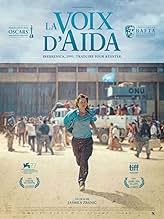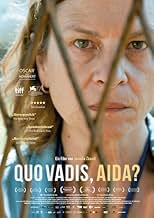IMDb रेटिंग
8.0/10
41 हज़ार
आपकी रेटिंग
ऐदा छोटे से शहर श्रीब्रेनिका में संयुक्त राष्ट्र के लिए एक अनुवादक है.ऐदा छोटे से शहर श्रीब्रेनिका में संयुक्त राष्ट्र के लिए एक अनुवादक है.ऐदा छोटे से शहर श्रीब्रेनिका में संयुक्त राष्ट्र के लिए एक अनुवादक है.
- 1 ऑस्कर के लिए नामांकित
- 40 जीत और कुल 43 नामांकन
सारांश
Reviewers say 'Quo Vadis, Aida?' is a powerful, harrowing film about the Srebrenica massacre, praised for impactful storytelling and strong performances, especially Jasna Duricic as Aida. It critically examines the United Nations' failure and explores themes of war and survival. While lauded for emotional depth and historical significance, some criticize perceived inaccuracies and over-dramatization. It is considered an important, though challenging, film that highlights a significant historical event.
फ़ीचर्ड समीक्षाएं
Nominated for Best International Feature Film at the last Oscars, Quo vadis, Aida follows a UN translator's plight to save her family from imminent death in the wake of Bosnian War and also covers the events that led to the Srebrenica massacre. A powerful, heartbreaking & devastating account of human injustice & global apathy, this Bosnian war drama is one of the best films of its year.
Written & directed by Jasmila Zbanic, the drama centres around a fictional family in the middle of a real-life conflict but through their predicament, it effectively captures the utter despair & helplessness the refugees faced, not only from their persecutors but also from their supposed saviours. Zbanic lays bare the grave incompetence of United Nations whose lack of action only ended up enabling the wholesale killings.
Zbanic makes sure the family the story focuses on looks & feels as real & authentic as possible, and the drama she conjures around them is compelling throughout. It's disturbing to watch UN delegates failing to do the one thing their organisation exists for and how they simply stood aside as mere spectators after letting the fox into the henhouse. Jasna Duricic leads from the front with an outstanding performance and she is strongly supported by the rest.
Overall, Quo vadis, Aida is a brutal, harrowing & profoundly upsetting example of its genre that provides a scorching account of the lifetime of pain & trauma that warfare leaves behind and also exposes the failure & indifference of the international council that indirectly pave the way for such atrocities. Bringing the horrors of Srebrenica to screen with cut-throat intensity and leaving us shattered with its gut-punching finale, this Bosnian war film is essential viewing by all means. In a word, unforgettable!
Written & directed by Jasmila Zbanic, the drama centres around a fictional family in the middle of a real-life conflict but through their predicament, it effectively captures the utter despair & helplessness the refugees faced, not only from their persecutors but also from their supposed saviours. Zbanic lays bare the grave incompetence of United Nations whose lack of action only ended up enabling the wholesale killings.
Zbanic makes sure the family the story focuses on looks & feels as real & authentic as possible, and the drama she conjures around them is compelling throughout. It's disturbing to watch UN delegates failing to do the one thing their organisation exists for and how they simply stood aside as mere spectators after letting the fox into the henhouse. Jasna Duricic leads from the front with an outstanding performance and she is strongly supported by the rest.
Overall, Quo vadis, Aida is a brutal, harrowing & profoundly upsetting example of its genre that provides a scorching account of the lifetime of pain & trauma that warfare leaves behind and also exposes the failure & indifference of the international council that indirectly pave the way for such atrocities. Bringing the horrors of Srebrenica to screen with cut-throat intensity and leaving us shattered with its gut-punching finale, this Bosnian war film is essential viewing by all means. In a word, unforgettable!
The Bosnian entry for the Best International Feature Academy Award, "Quo Vadis, Aida?" is better than the odds-on favorite to actually win the Oscar, "Druk" (a.ka. "Another Round," 2020), being that it's actually about something that matters and is emotionally devastating--so much so that the eponymous Aida literally begs to make a Sophie's Choice at one point. The protagonists in both are teachers, and neither one ultimately affects any real change, but one is living history while the other rambles to high-schoolers about his famous favorite fellow drunkards. Both pictures are alienating: this one forcing us to witness the horrific Srebrenica massacre that we're unable to alter, and the other makes one feel like the designated driver to a bunch of binge-drinking dolts whining about their so-called mid-life crises. As opposed to waiting impatiently to drive the inebriated teachers home, however, "Quo Vadis, Aida?" does well to pull the spectator into the chaos. There's nary a dull moment in following Aida (as played rivetingly well by Jasna Duricic--seriously, Academy, you missed a nominee) around a makeshift UN refugee camp as she frantically tries to save the lives of her husband and two sons from the approaching slaughter by Ratko Mladic's Bosnian Serb Army and as the United Nations and their so-called, shorts-wearing peace keepers impotently stand by and refuse to help.
I want to note, too, that Aida being a translator, or interpreter, as the case may be (that "piano player" as "messenger" part early on, e.g.), makes for an interesting dynamic in the subtitling of the picture, among other things--much of it disregarded as unnecessary because of it. There's actually a good deal of English here beside other languages. Another good reason for the Oscar category name change from "Foreign Language Film" to "International Feature."
Additionally, amid all that, writer-director Jasmila Zbanic and company also do something reflexively interesting cinematically. While the real war is nothing more than a one-sided genocide slaughtering Bosniak Muslim males, there's another battle here for the cinematic control of the narrative. On one side, there's Mladic with the cameraman he continually tells what to shoot, and who in return reassures the would-be convicted war criminal that he'll fix his inane monotony with montage. We never see that film here, though--only its making from the outside, where its propagandistic lies are all the more apparent. And, on the other side, we have the faces of the people in the outer, film proper that is "Quo Vadis, Aida?" We see this in intermittent series of return gazes--of people looking directly, or close to, at the camera and, thus, us, the audience. They're the victims of the genocide within the narrative and, as the case may be, interpreting the real tragedy onto the screen, but through these return gazes, seize control of the narrative. This is their movie.
I want to note, too, that Aida being a translator, or interpreter, as the case may be (that "piano player" as "messenger" part early on, e.g.), makes for an interesting dynamic in the subtitling of the picture, among other things--much of it disregarded as unnecessary because of it. There's actually a good deal of English here beside other languages. Another good reason for the Oscar category name change from "Foreign Language Film" to "International Feature."
Additionally, amid all that, writer-director Jasmila Zbanic and company also do something reflexively interesting cinematically. While the real war is nothing more than a one-sided genocide slaughtering Bosniak Muslim males, there's another battle here for the cinematic control of the narrative. On one side, there's Mladic with the cameraman he continually tells what to shoot, and who in return reassures the would-be convicted war criminal that he'll fix his inane monotony with montage. We never see that film here, though--only its making from the outside, where its propagandistic lies are all the more apparent. And, on the other side, we have the faces of the people in the outer, film proper that is "Quo Vadis, Aida?" We see this in intermittent series of return gazes--of people looking directly, or close to, at the camera and, thus, us, the audience. They're the victims of the genocide within the narrative and, as the case may be, interpreting the real tragedy onto the screen, but through these return gazes, seize control of the narrative. This is their movie.
The main actress Jasna Djuricic deserves an Oscar. She gave such a great portrayal of a mother and a wife who's traying her best in the worst of situation. God forbid anyone finds themselves in that situation.
I am a guy from Serbia and I gave this movie 10/10 because it has really good script and it is true work of art. I wish directors from Serbia would make more films which are as good as this one.
The film covers the topic on Srebrenica genocide, which was committed in 1995 in Bosnia. It is portrayed through a family story, with Aida, a translator for the UN, as the main character.
A sad, but an important lecture on what hatred can make people do.
क्या आपको पता है
- ट्रिवियाJasna Djuricic, who plays the main role, is the wife of Boris Isakovic, who plays general Mladic. They often work together in film and theater, but in this film they don't share any scenes.
- भाव
Aida Selmanagic: We are on the list!
- कनेक्शनFeatured in 93वें अकादमी पुरस्कार (2021)
टॉप पसंद
रेटिंग देने के लिए साइन-इन करें और वैयक्तिकृत सुझावों के लिए वॉचलिस्ट करें
- How long is Quo Vadis, Aida??Alexa द्वारा संचालित
विवरण
- रिलीज़ की तारीख़
- कंट्री ऑफ़ ओरिजिन
- आधिकारिक साइटें
- भाषाएं
- इस रूप में भी जाना जाता है
- Where are you going, Aida?
- फ़िल्माने की जगहें
- उत्पादन कंपनियां
- IMDbPro पर और कंपनी क्रेडिट देखें
बॉक्स ऑफ़िस
- बजट
- €45,00,000(अनुमानित)
- दुनिया भर में सकल
- $8,13,253
- चलने की अवधि1 घंटा 41 मिनट
- रंग
- ध्वनि मिश्रण
- पक्ष अनुपात
- 1.85 : 1
इस पेज में योगदान दें
किसी बदलाव का सुझाव दें या अनुपलब्ध कॉन्टेंट जोड़ें



![Trailer [OV]](https://m.media-amazon.com/images/M/MV5BNjFiN2EzNDItMzBiNy00YjI4LTkwM2YtN2YxYzcwYmYzYjIxXkEyXkFqcGdeQXRyYW5zY29kZS13b3JrZmxvdw@@._V1_QL75_UX500_CR0)






























